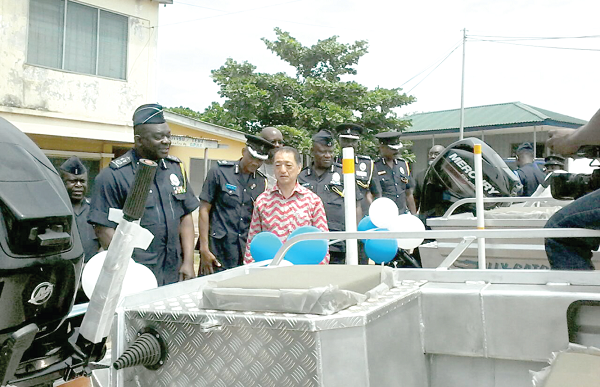
Marine Police Unit takes delivery of 2 patrol boats
The Marine Police Unit (MPU) of the Ghana Police Service has taken delivery of two patrol boats to boost the capacity of the unit to protect the country's territorial waters.
The boats, valued at $53,000, were provided by the United Nations Office of Drug and Crime (UNODC), with funding from the Government of Japan under the Global Maritime Crime Programme, to help enforce maritime laws, fight the drug trade and prevent illegal fishing in the country's waters.
Advertisement
Speaking at the hand-over ceremony in Tema last Friday, the Inspector-General of Police (IGP), Mr David Asante-Apeatu, said the primary function of the police included the protection of lives and properties and the management of crime.
Transformation agenda
He said that was why the Ghana Police Transformation Agenda, being spearheaded by the service, had been categorised into five thematic areas, with the welfare of the officer on the ground being the top priority.
The IGP assured the personnel of the service of his administration’s commitment to equip the service to enhance its operational capabilities, revamp the Criminal Investigations Department (CID), use Information and Communications Technology and make community policing a key policing intervention towards crime prevention and community safety.
He said in enhancing the operational capabilities of the service, the Police Administration was mindful of the important role that onshore and offshore security played in the integrated approach and commended the UNODC and the Japanese Government for re-equipping the MPU.
“Our collaboration with Japan and the UNODC over the years has yielded a lot of mutual benefits, but today’s package is exciting, motivating and strategic,” he said.
While expressing appreciation to the donors for the support, Mr Asante-Apeatu appealed to individuals, organisations and agencies to consider in their annual budgets some space within their corporate social responsibility to support the police, stressing: “The truth is that security is a shared responsibility and if we tackle it collectively, we will be secure individually.”
Effects of maritime crimes
The Japanese Ambassador to Ghana, Mr Tsutomu Himeno, said reports of maritime crime in the West African sub-region were on the increase, with frequent incidents of ship hijacking, kidnapping of crews, as well as fishing violations, such as pair trawling that occur in Ghana’s sea.
He stressed that maritime crimes, including piracy, fishing crime, trafficking in persons, drugs and weapons, were a major security and social concern that must be curbed to ensure stability and the smooth conduct of legitimate business in West African waters.
“Maritime security is indispensable for greater trade and investment relations between Ghana and other countries.
It is also very important for Ghana to serve as an important gateway for its inland neighbours.
Proper development will only occur when there is peace and stability,” he said.
Mr Himeno said Japan, for its part, was interested in ensuring peace and stability on the oceans, as the sea served as a major means of economic cooperation among nations.
Challenges
The National Programme Coordinator of the UNODC, Mr Bernard Henebeng Asamoah, in his remarks, said maritime crimes posed a serious threat to the safety of seafarers, international trade and regional stability, which had become a problem in the sub-region and needed serious attention.
He said those challenges were vigorously being tackled by the UNODC through the Global Maritime Crime Programme and explained that through that initiative, the UNODC had secured support from Japan to implement a one-year project to support maritime law enforcement in Ghana, Sierra Leone and Liberia to fight against maritime crime.
Capacity booster
The Director of the MPU, Assistant Commissioner of Police Mr Seidu Iddi, said the arrival of the two amphibious boats would strengthen the capacity of the unit and help personnel to effectively combat all forms of maritime offences and other crimes on both the sea and inland rivers and other water bodies.
He added that they would also help the unit support emergency flood rescue operations in the cities and towns.




